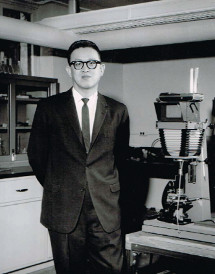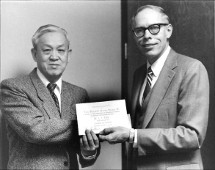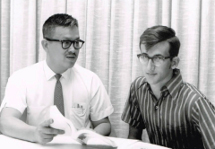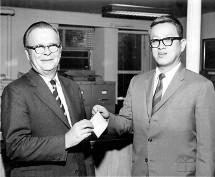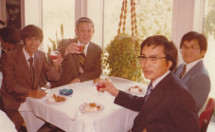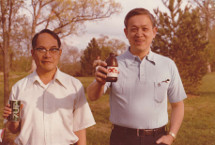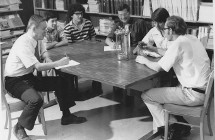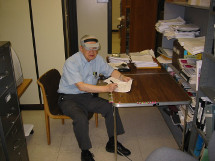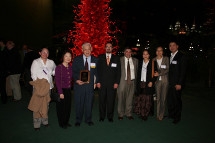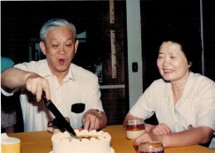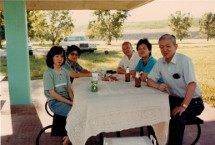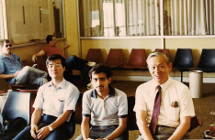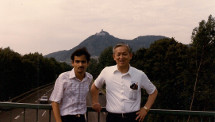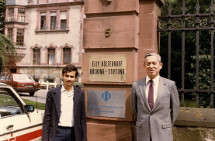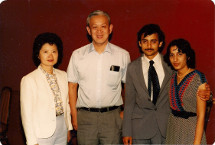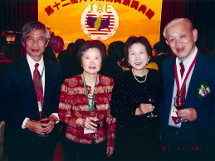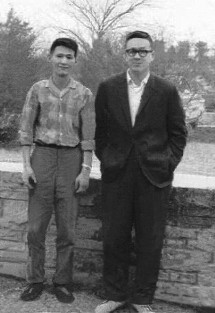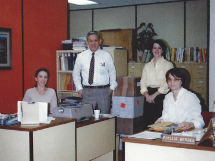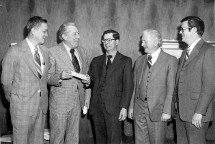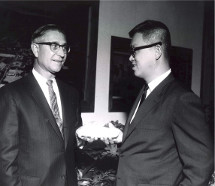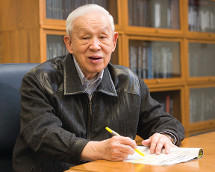L.T. Fan (1929-2014)
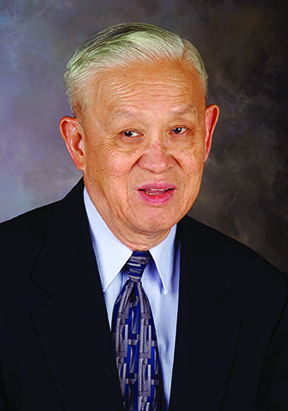 Dr. Liang-tseng “L.T.” Fan, died Aug. 4, 2014, at the age of 84. His contributions to the department of chemical engineering at Kansas State and to the chemical engineering profession as a whole are substantial. He was instrumental in securing funding for the construction of Durland Hall while serving as department head of the department of chemical engineering, founded and directed the activities of a number of companies, authored or coauthored seven books and more than 600 journal articles that have been cited more than 6,000 times according to the Science Citation Index.
Dr. Liang-tseng “L.T.” Fan, died Aug. 4, 2014, at the age of 84. His contributions to the department of chemical engineering at Kansas State and to the chemical engineering profession as a whole are substantial. He was instrumental in securing funding for the construction of Durland Hall while serving as department head of the department of chemical engineering, founded and directed the activities of a number of companies, authored or coauthored seven books and more than 600 journal articles that have been cited more than 6,000 times according to the Science Citation Index.
Beyond these achievements, Fan had an enormous influence on the people around him. This includes both his family, and the students and colleagues he worked with over his distinguished career.
Fan is survived by one son, Tso Yee Fan and his wife Deborah Haley, Belmont, Massachusetts; one daughter, Judith Fan and her husband Robert Reay, Mountain View, California; four grandchildren: Lauren and Mitchell Reay, and Olivia and Spencer Fan; one brother, Liang-shing Fan, Ft. Collins, Colorado; and two sisters, Liang-ing Tsai, Cincinnati, Ohio, and Liang-Whey Lee, Fremont, California.
Honoring Dr. Fan
To honor L.T. Fan's distinguished career, comments were solicited from his former students and colleagues on their memories of working with him.
Yee-Wei Huang, Ph.D. 1988
Dr. Fan has impacted my life and my career in so many ways – all positive to say the least. Dr. Fan told me, "There are many ways to complete a task. If given one day, you finish it in a one-day way. If given one month, you finish it in a one-month way. You should never complain not enough time or too much time."
When approached for an answer, Dr. Fan would ask me to come back with three possible answers to my own question. He would then discuss with me the plausibility of each answer. Sometimes this led to a fourth or fifth possibility. “I don't know” was never an acceptable answer.
Mahendra Gharpuray, Ph.D. 1986
Dr. Fan played an instrumental role in my life and whatever I have achieved, I owe it to him to a large degree. He was very methodical and paid attention to every minor detail. He insisted on perfection even if that meant a lot more work. He was very dedicated and worked incessantly, and was very passionate about his work. His influence has instilled a work ethic that I have followed throughout my life. He was not only my major professor but also a mentor and guide. In many respects he was my parent as well. Having come from India, he knew I needed someone to take care of personal needs beyond academics.
Shenyann Chiu, Ph.D. 1971
Even after more than 48 years, I still vividly remember meeting the first time with Dr. Fan in the old CHE building on an extremely cold winter day of Jan. 28, 1966. Three days before that, upon my arrival in Los Angeles from Taiwan, and through an introduction of Dr. S.J. Chen — Dr. Fan’s former student residing there — Dr. Fan asked me to stop by Manhattan on my way to Missouri for my graduate study there. That meeting with Dr. Fan changed my life entirely. Instead of continuing going east, I decided to stay in Manhattan to work on my graduate studies and to work under Dr. Fan as one of his research assistants. During the next five years, Dr. Fan helped me set up my curriculum, and guided me in numerous laboratory studies in areas related to salt water desalination and biological wastewater treatment. The training and work experiences under Dr. Fan through my M.S. and Ph.D. programs substantially improved my abilities and eventually helped me sail through my research careers with Midwest Research Institute in Kansas City, Missouri, and Argonne National Laboratory in Illinois.
After leaving Manhattan, I continued to communicate and cooperate with Dr. Fan throughout the next 43 years. I regard it a tremendous privilege and blessing to have been one of his students. He taught me how to do research — from identifying proper subjects, setting objectives, designing and implementing work plans, interpreting results, to writing for publications. By working hard himself, and being so considerate, fair, disciplined and enthusiastic, he showed me how to lead and influence people in positive ways. He was always generous in spending time with me and in showing appreciation to my efforts. I am in debt to Dr. Fan in so many aspects that are almost impossible to numerate.
Dr. Fan not only is my teacher, but also a role model and a good friend.
Thank you from the bottom of my heart, Dr. Fan.
Robert Shipman, M.S. Food Science 1974
I am forever appreciative of his guidance and encouragement during my graduate years at KSU.
V. Grant Fox, Ph.D. 1967
My memories of that time long ago are of hard work and good times.
Larry Erickson, Ph.D. 1964 and colleague in the department of chemical engineering 1964-2014
When I was an undergraduate student, I helped Dr. Fan with a research project. My main memory of that experience was the Ph.D. dissertation of Paul Shannon. It was a large dissertation. Dr. Fan asked me to read it, find the important parts and copy those parts. He encouraged me to type rather than write in doing this; this was before the copy machine.
As a graduate student, I was in the first class to use the newly published Bird, Stewart and Lightfoot book Transport Phenomena, copyright 1060. Dr. Fan assigned individual problems to each of us so that all of the problems in each chapter of the book would be worked.
Dr. Fan also taught from the book by Levenspiel, Chemical Reaction Engineering, copyright 1962, when it was new. He had a great appetite for what was new in chemical engineering.
When Dr. Fan found an important paper, he would make copies so each student would have a one. This made it easier to find a copy when we wanted to go back to it later.
Dr. Fan made a great effort to use English properly. He consulted dictionaries and looked at the writings of others. He wanted his students to learn to use good English also.
Dr. Fan had a passion for research and enjoyed his work. He helped me to understand the joy of professional work as an educator and researcher.
I was very fortunate to have had the opportunity to be his student and learn from him. We were able to accomplish much together.
Chiu-sen Wang, M.S. 1963
I started my graduate studies at Kansas State University in February 1962. After discussions with Dr. Fan, I decided to work on systems optimization for my master's degree thesis. Two versatile mathematical optimization methods were developed in the 1950s: the dynamic programming theory devised by Richard Bellman and the discrete maximum principle formulated by L.S. Pontryagin. While we were trying to apply these two methods to multistage processes, Stanley Katz published a paper on a discrete version of Pontryagin's maximum principle in August 1962. We found that the algorithm described by Katz can be extended with some modifications to solve optimization problems of multistage processes with product recycle. I summarized the results of our analysis in a short technical note for publication. Dr. Fan quickly edited the draft and asked his wife Eva to type the revised note in the evening on the day I gave him the draft. The manuscript was submitted to Chemical Engineering Science on the following day. I went on to analyze some other processes and received my master's degree in June 1963. Quite pleased with the results we had obtained, Dr. Fan asked me to stay in Manhattan in the summer of 1963 to write a monograph with him. When a draft of the monograph was completed in late August, I left for Pasadena, California, to pursue my Ph.D. at Caltech. The monograph, entitled "The Discrete Maximum Principle: a Study of Multistage Systems Optimization," was published in 1964. Dr. Fan remained my inspiration long after I left Kansas State University.
J.H. Edgar, colleague in the department of chemical engineering 1988-2014
As I was beginning my career as an assistant professor, Dr. Fan gave me simple but excellent advice that profoundly influenced my career. He said, "Write papers; this is the way to achieve academic recognition and success." This was a revelation: the importance of writing had never occurred to me. At that time, I only had one publication, and that was in a conference proceedings in which all papers were accepted without review. I wasn't confident in my research and I didn't think I had anything interesting to write about. But Dr. Fan encouraged me, advised me to persist, and said that writing would help me to organize my ideas and would improve with practice.
I took Dr. Fan's advice to heart. Since I didn't have any research results to report, I wrote a review paper summarizing the state of the art of wide band gap semiconductors. This proved to be a good choice; the paper was published just as this research field began phenomenal growth that continues today. I worked on this review paper continuously for a year, editing and revising extensively. Dr. Fan reviewed the paper several times, improving my English and helping me to develop a clear writing style. Once published, the paper received a lot of attention and led to an offer to edit a book in this new field, thereby helping me to establish credibility. Subsequently, my research funding improved; writing clearly helped me to prepare good proposals.
Some of Dr. Fan's advice on writing included (a) use the semicolon, (b) rotate verbs, (c) strive for brevity and (d) organize in paragraphs. He also recommended revising your work many times; those incremental improvements can change a manuscript from good to excellent. He told me he revised his last book eight times. Dr. Fan also recommended following examples of good writers. He recommended "The Principles of Chemical Thermodynamics" by Kenneth Denbigh to his students. Dr. Fan continuously studied style guides to improve his writing. In his last year, he proudly told me he had just purchased the 30th anniversary edition of William Zinsser's book On Writing Well: The Classic Guide to Writing Nonfiction.
Dr. Fan's writing and editing skills brought out the best of his colleagues and students. Collaborating with Dr. Fan ensured that the research would result in a high quality published paper. The list of his collaborators is extensive and he helped many faculty from K-State including J.R. Schlup, W.P. Wallawender, K.L. Hohn, P. Seib and Ronaldo Maghirang, just to name a few. Dr. Fan had many international collaborators. He published 40 paper with F. Friedler from the University of Pannonia, in Veszprem, Hungary, and 18 papers with S.T. Chou, Kun Shan University of Technology in Taiwan. Dr. Fan's former students now in academia have been successful in part due to the writing skills they learned from Dr. Fan. These include R.O. Fox, Iowa State University; Yinlun Huang, Wayne State University; F. Lai, University of Massachusetts Lowell; and S. Shenoi, University of Tulsa.
Dr. Fan enjoyed writing. Once I asked him about a vacation he took. He responded, "It was good; I got a lot done on two papers I'm writing."
I am grateful to Dr. Fan for introducing me to the pleasure of writing and for teaching me the skills to write better.
Benjamin G. Kyle, colleague in the department of chemical engineering 1958-1996
L.T. and I were both hired at Kansas State in the spring semester of 1958 as new Ph.Ds. and we remained colleagues until last August. My area of specialty was thermodynamics and L. T.'s was applied mathematics. I pretty much remained in my chosen area, but L. T.'s interest knew no bounds. I have never known anyone as brilliant or as dedicated to the pursuit of knowledge. As his resume clearly shows, he did pioneer work in many areas of applied mathematics and his need to be on the forefront of expanding knowledge carried over to the department's teaching program.
We had come to Kansas State just after Sputnik and were educated in what I will call "classical" chemical engineering. This changed rather suddenly with the development of transport phenomena and process dynamics, and I had to run to keep up. L. T. eagerly embraced these new developments as exemplified by writing the authors for an as-yet unpublished copy of Transport Phenomena from which he taught a graduate course. Largely through his efforts and his infectious enthusiasm, our undergraduate and graduate curricula were modernized. L. T. was always proud of our curriculum and we both agreed that ours was one of the better programs in the country. This important aspect of his career is often overshadowed by his immense research accomplishments.
While L. T. did not devote a lot time for faculty chatting, I always enjoyed the occasions he would stop by my office to unwind after a long day. We would discuss the state of department, college and university; and professional, national and world affairs of which he was always well informed. As Democrats in a red state, we often had much to commiserate about. After my retirement in 1996, we saw each other less frequently but we always enjoyed each other's company. I am proud to say that L. T. Fan was my long-time colleague.
Dick Akins, colleague in the department of chemical engineering 1963- 2002
Most people think about research when L.T. is mentioned. Of course, there are very good reasons for that considering the unusual amount and variety of his research. I would like to mention his ability as a teacher. Sometime in the late 70s the CHE faculty decided there should be no reason why every faculty member couldn't teach any of the undergraduate courses. Some would be better at one or two courses than perhaps others, but having all the faculty knowledgeable of every course seemed to be something worth pursuing. L.T. agreed and offered to teach Introduction to Process Analysis and, a semester or so later, Lab 3. I, along with most of the other faculty, wondered how he would do considering he spent almost all of his time with graduate students and research. We need not have worried; he did an outstanding job and I heard many undergraduates say how well he explained complex ideas, and how accessible he made himself to them.
Later, I sat in on L.T.'s graduate course on "The Continuous Maximum Principle." He was recognized as a leader in this subject and I had attempted to learn about it by reading his and other texts without much success. His lectures made the subject understandable and interesting.
He could come up with simple illustrations for very complex topics.
L.T. had a remarkable memory and rarely forgot names, research ideas or past events. Once in a faculty meeting he related how, as a young man in school during the Japanese occupation of Taiwan, he was forced to dig trenches during the day and then have a more or less primitive school session at night. He said that the only books available were a few that the instructor had somehow managed to keep. The students had to memorize sine and log tables, and all the equations that would allow calculation of other trig functions and logarithms. We asked if he still remembered the tables and, upon us giving him various angles (five-degree increments), he told us the sines to five figures! The same with logarithms. He felt that those early disciplines were the reason he continued to have such a remarkable memory.
|
L.T. Fan shortly after arriving at K-State. |
L.T. Fan with Larry Erickson |
John R. Schlup discussing chemical engineering plans during an advising session with L.T. Fan. |
|
The Dept of Chemical Engg received $1500 from Monsanto Company, St. Louis, Missouri, to be used for 12 undergraduate scholarships. |
Photo submitted by Dr. Ed Hsu |
Photo submitted by Dr. Ed Hsu |
|
Photo submitted by Dr. Ed Hsu |
2006 in Durland Hall, L.T. Fan needed to wear special glasses to read and write. (Photo submitted by Dr. Tengyan Zhang) |
2007 at Salt Lake City during AIChE Annual Meeting while he received the AIChE Particle Technology Forum Award (Photo submitted by Dr. Tengyan Zhang) |
|
L.T. Fan celebrating his birthday in 1983 (Photo submitted by Dr. Yee-Wei Huang) |
L.T. and Eva Fan, Mrs Fan's father and Dr. Yee-Wei Huang and wife (Photo submitted by Dr. Yee-Wei Huang) |
May 1981 visit to Gatlinburg, Tennessee, attending and presenting at the Biotechnology Conference. (Photo submitted by Dr. Mahendra Gharpuray) |
|
August 1984 Germany visit. (Photo submitted by Dr. Mahendra Gharpuray) |
August 1984 Germany visit. (Photo submitted by Dr. Mahendra Gharpuray) |
July 1985 completion of Mahendra Gharpuray's Ph.D. Pictured left to right: Eva and L.T. Fan, Archana and Mahendra Gharpuray. (Photo submitted by Dr. Mahendra Gharpuray) |
|
2001, L.T. Fan received a Taiwanese-American Foundation Award. In picture left to right: Dr. Chiu-sen Wang, Eva Fan, Yoshiko Wang, and Dr. L.T. Fan. (Photo submitted by Dr. Chiu-sen Wang) |
Mike Chen and L.T. Fan |
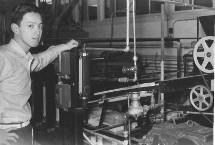 |
|
Chemical Engineering Office Staff. |
Dow Corning |
Mobile Oil |
|
Dr. L.T. Fan |
||
